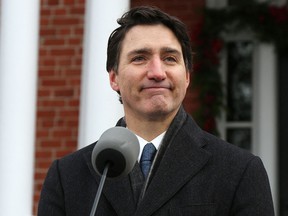Trudeau Steps Down as Prime Minister, Ending Months of Speculation
In a move that has sent shockwaves through the Canadian economy, Justin Trudeau has announced his intention to step down as prime minister once a new leader of the Liberal Party is selected. The resignation comes after months of speculation and uncertainty, which has had a significant impact on the country’s economic outlook.
A New Wave of Uncertainty for the Economy
Tu Nguyen, an economist at tax consultant RSM Canada, believes that Trudeau’s resignation will usher in a "new wave of uncertainty" for the Canadian economy and financial markets. The Bloomberg Canada Economic Policy Uncertainty Index has surged to 650, its highest level ever, far outstripping its last peak posted at the start of the pandemic.
Investors Scared Off by Political Instability
Nguyen worries that the uncertainty caused by a prorogued Parliament could discourage foreign investment in Canada. Political stability has attracted investors to Canada in the past, but the current situation may deter them from investing in the country.
The Rebound Year in Jeopardy
This year was supposed to be a rebound year for the Canadian economy, with inflation continuing to ease and Bank of Canada interest rate cuts boosting economic growth. However, Nguyen believes that the latest bout of political instability could delay recovery as businesses may adopt a wait-and-see approach instead of investing.
A Power Vacuum at a Bad Time
Stephen Brown, Capital Economics Ltd.’s assistant chief North America economist, describes the upheaval in the Liberal Party as a "power vacuum" at a bad time. With Donald Trump repeating his threat of 25% tariffs and the clock ticking down to inauguration day, Canada needs stability more than ever.
Conservative Policies May Resonate with Republicans
Brown believes that a new Conservative government led by Pierre Poilievre would stand a better chance of working with the new United States administration. Among the Conservative policies that Brown said would resonate with Republicans are a balanced budget rule, reduction in capital gains taxes, and a promise to significantly reduce regulations hindering business investment.
A Federal Policy Sea Change
Tony Stillo, chief economist at Oxford Economics, thinks Trudeau’s resignation accelerates an expected "sea change" in federal policy. A spring election is more likely, with the New Democratic Party and Bloc Québécois pressing the Liberals to include their priorities in the next federal budget.
Implications for Economic Policy
If the Conservatives secure a majority, they would have the ability to reduce the size of government, restore fiscal balance, and cut taxes. Other leading priorities include axing the carbon tax and cutting immigration.
What’s Next for Canada’s Economy?
The resignation of Justin Trudeau marks a significant turning point in Canadian politics. The impact on the economy will be felt for months to come. With a new leader at the helm of the Liberal Party, there is uncertainty about what policies will emerge. However, one thing is clear: Canada needs stability and leadership now more than ever.
Recommended Reading
- Justin Trudeau to resign after Liberals choose new leader
- Jack Mintz: A sinking dollar is Trudeau’s latest legacy
Join the Conversation
Share your thoughts on what Trudeau’s resignation means for Canada’s economy. What do you think the implications will be? Should the Conservatives secure a majority, or would another party be better suited to lead the country?
Post your comments below and join the discussion.



